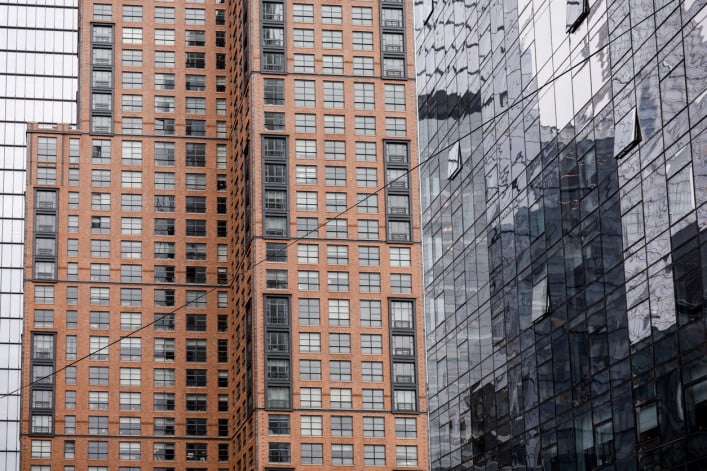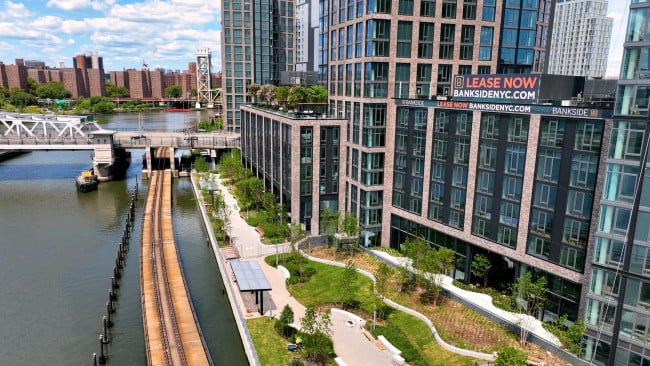NYC neighborhoods with the highest shares of concessions for renters
- Windsor Terrace and Mott Haven are top nabes for concessions as per StreetEasy
- Freebies can include owner-paid broker fees, free months, or waived amenity fees
- Budget carefully: Concessions typically go away when you renew a lease

Neighborhoods where new rental developments are prevalent also have the highest shares of concessions for renters.
iStock
Concessions can make renting temporarily more affordable, if you know how to find a landlord or developer who is offering them. Just don’t get tripped up at lease renewal time.
Concessions are freebies from owners and developers to encourage renters to sign a lease. They’re more prevalent when the market is slow, meaning when there is less competition for rentals—which is not what is happening right now. On the other hand, no matter what’s going on in the market, you stand a good chance of getting a concession in a new building that has lots of vacant units or is hard to lease because of the location or some other reason.
Concessions can come in different forms such as owner-paid broker fees or the owner paying the rent, typically one month but sometimes more.
“We’re seeing rent concessions range from landlords covering the brokerage commission to a month or even 1.5 months of free rent time offered for newly signed leases, and sometimes both,” said Brian Hourigan, managing director and director of professional development at brokerage BOND New York. “We’re also seeing first-year amenity fees being waived for full-service luxury properties.”
Where can you get a concession?
A new report by Kenny Lee, an economist for StreetEasy, identifies the top neighborhoods for concessions—which also turn out to be areas with the highest number of new rental buildings. In December, according to the report, concessions were most prevalent in Windsor Terrace, Brooklyn; Mott Haven, the Bronx; and Jamaica, Queens.
In Windsor Terrace, nearly two in three rentals offered concessions, the highest of any NYC neighborhood with at least 100 rental listings in December. For Mott Haven and Jamaica, as well as Midtown South and Battery Park City, more than half of all rental listings in December came with concessions, Lee said.
Neighborhoods with the highest shares of rental concessions
Neighborhood | Borough | Share of rentals with concessions | Share of rentals in buildings constructed since 2010 | Median net-effective rent* | |
1 | Windsor Terrace | Brooklyn | 64 percent | 58 percent | $3,311 |
2 | Mott Haven | Bronx | 59 percent | 95 percent | $2,669 |
3 | Jamaica | Queens | 56 percent | 90 percent | $2,475 |
4 | Midtown South | Manhattan | 53 percent | 34 percent | $4,697 |
5 | Battery Park City | Manhattan | 50 percent | 1 percent | $4,472 |
6 | Long Island City | Queens | 48 percent | 85 percent | $4,202 |
7 | Downtown Brooklyn | Brooklyn | 47 percent | 74 percent | $4,219 |
8 | DUMBO | Brooklyn | 42 percent | 79 percent | $6,120 |
9 | Financial District | Manhattan | 40 percent | 19 percent | $4,263 |
10 | Greenpoint | Brooklyn | 36 percent | 64 percent | $4,459 |
Source: StreetEasy data. Only neighborhoods with at least 100 listings in December were included in the analysis. *Net-effective rent distributes the discount from free months of rent across the lease term.
In December, 58 percent of rentals in Windsor Terrace were in buildings constructed since 2010. Some are very recent, like One Park Point, a 375-unit building built in 2024, which includes mixed-income, rent-stabilized apartments.
Lee pointed out that top neighborhoods for concessions were also ones that had targeted rezonings. In Mott Haven, which experienced a series of rezonings, 95 percent of all rental listings in December were in newly constructed buildings.
When do you get your free month?
If you are getting a “free month,” the timing varies depending on the owner or management company. Renters often receive the free month upfront, meaning they pay nothing for the first month, said Laurel Ferrera, an agent at Keller Williams NYC. This helps reduce move-in costs, Ferrera said.
Some landlords apply the free month as the last month of the lease term, allowing tenants to skip payment in the final month, she said.
A third option is to spread the amount you save over the entire lease term, which is known as net effective rent.
For example, if your rent is $3,000 per month for a 12-month lease, and you are getting one month free, the rent you pay each month is discounted by $250 through the end of the lease ($3,000 ÷ 12 = $250).
“The exact approach is usually clarified in the lease agreement, so renters should confirm the terms with their landlord or broker to understand how the concession is applied,” Ferrera said.
Plan ahead for a rent increase
Landlords in NYC have strict income requirements for renters to qualify for apartments: Owners prefer renters who earn an annual salary of 40 times the monthly rent. But when you are getting a rent increase, you may find that equation no longer seems to matter (go figure).
If you are just barely qualifying for the apartment with net effective rent, beware. Concessions go away once the lease term ends, so you can expect to pay the full or “gross rent” when you renew.
Or you may face a rent increase at renewal time, which will be even harder on your wallet.
“Any rent increase will be calculated using the gross rent, the original rent amount before any concessions,” Ferrera said.
If you plan on staying for multiple years in the same apartment, consider your ability to pay the higher gross rent, Hourigan said. You want to avoid the “costly position of having to move again once the concession is no longer in effect and the rent reverts to the original higher listed price, making it unaffordable,” he said.
He suggested another alternative: Try to negotiate a lower gross rent instead of a one-time “free month.”
“Even if that means the tenant will pay slightly more during the initial lease term…if a landlord agrees to that tradeoff, future negotiations will be based on that lower gross price, which will make the unit more affordable for the tenant for a longer period of time,” Hourigan said.
You Might Also Like




























